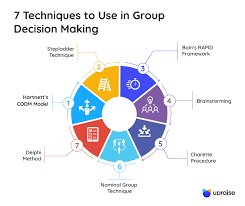The Psychology of Habitual Decision Making
When it comes to decision making, many of our choices are made out of habit rather than conscious thought. This phenomenon is known as habitual decision making, where we rely on automatic responses and routines to make everyday decisions.
Research has shown that habitual decision making is a powerful force in our lives, influencing everything from what we eat for breakfast to how we respond to stress. Habits are formed through repetition and reinforcement, creating neural pathways in the brain that make certain behaviors automatic.
While habits can be beneficial in simplifying our daily lives, they can also lead to mindless decision making. When we rely too heavily on habits, we may overlook better options or fail to consider new information that could lead to more optimal choices.
Breaking free from habitual decision making requires awareness and intentionality. By pausing to reflect on our choices and considering alternative options, we can break out of autopilot mode and make more deliberate decisions that align with our goals and values.
Developing new habits that support our desired outcomes can also help us overcome the inertia of old habits. By consciously practicing new behaviors and reinforcing them over time, we can reshape our decision-making patterns and create positive change in our lives.
In conclusion, understanding the psychology of habitual decision making can empower us to take control of our choices and live more intentionally. By cultivating awareness, challenging old habits, and embracing new possibilities, we can break free from automatic responses and make decisions that truly serve us.
8 Key Strategies for Mastering Habitual Decision Making
- Identify your habits and routines
- Understand the triggers that lead to certain habits
- Evaluate whether your habits are serving you positively or negatively
- Start small when trying to change a habit
- Create a specific plan for changing a habit
- Stay consistent in your efforts to establish new habits
- Seek support from friends or professionals if needed
- Be patient with yourself as changing habits takes time
Identify your habits and routines
To improve your decision-making process, it is essential to identify your habits and routines. By recognizing the patterns and behaviors that drive your daily choices, you can gain insight into how your habits may be influencing your decisions. Take the time to reflect on your typical routines and consider whether they are serving you well or if there are areas where change may be beneficial. Awareness of your habits is the first step towards breaking free from automatic decision making and creating space for more intentional choices that align with your goals and values.
Understand the triggers that lead to certain habits
Understanding the triggers that lead to certain habits is crucial in breaking free from automatic decision making patterns. By identifying the cues or situations that prompt habitual behaviors, we can interrupt the cycle and create space for more conscious choices. Whether it’s stress, boredom, or environmental cues, recognizing these triggers empowers us to respond mindfully and intentionally, ultimately allowing us to make decisions that align with our values and goals.
Evaluate whether your habits are serving you positively or negatively
When considering habitual decision making, it is essential to evaluate whether your current habits are serving you positively or negatively. Take the time to reflect on how your habits impact your daily life, goals, and overall well-being. By assessing the outcomes of your habits, you can determine which ones contribute to your growth and happiness, and which ones may be holding you back. Making a conscious effort to identify and change habits that no longer serve you positively can lead to more intentional decision making and a greater sense of control over your life.
Start small when trying to change a habit
When attempting to change a habit, starting small can be a highly effective strategy. By breaking down the desired change into manageable steps, individuals can gradually build momentum and increase their likelihood of success. Whether it’s incorporating a new behavior or eliminating an old one, taking small, consistent actions allows for sustainable progress and helps to establish a solid foundation for long-term habit transformation. This approach not only makes the process more achievable but also fosters a sense of accomplishment and motivation along the way.
Create a specific plan for changing a habit
Creating a specific plan for changing a habit is a crucial step in breaking free from automatic decision making patterns. By outlining clear and actionable steps towards modifying a habit, individuals can set themselves up for success in creating lasting change. This plan should include specific details such as identifying triggers, setting achievable goals, and implementing strategies to overcome obstacles. With a well-defined roadmap in place, individuals can navigate the process of habit change with intentionality and purpose, increasing their chances of successfully replacing old habits with healthier and more beneficial ones.
Stay consistent in your efforts to establish new habits
Staying consistent in your efforts to establish new habits is crucial when it comes to breaking free from the cycle of habitual decision making. By committing to practicing new behaviors regularly and reinforcing them over time, you can gradually replace old habits with more intentional choices. Consistency is key in rewiring your brain and creating lasting change, so stay dedicated to your efforts and trust that each small step you take towards establishing new habits will lead to greater control over your decision-making process.
Seek support from friends or professionals if needed
When navigating the challenges of habitual decision making, seeking support from friends or professionals can be a valuable resource. Discussing your decision-making patterns with trusted individuals can offer fresh perspectives and insights that may not have occurred to you on your own. Friends can provide emotional support and encouragement, while professionals, such as therapists or counselors, can offer expertise in behavior change and help you develop strategies to break free from unhelpful habits. Remember, reaching out for support is a sign of strength and can empower you to make positive changes in your decision-making process.
Be patient with yourself as changing habits takes time
Changing habits takes time, and it’s important to be patient with yourself throughout the process. Habits are deeply ingrained patterns of behavior that don’t shift overnight. By acknowledging that change is a gradual journey, you can approach the process with compassion and understanding. Remember to celebrate small victories along the way and stay committed to your goal of breaking old habits and forming new, healthier ones. With perseverance and patience, you can successfully navigate the challenges of changing habitual decision making patterns and create positive transformations in your life.




